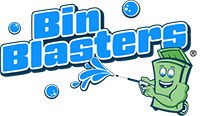Article Summary
- Start your bin cleaning equipment journey by focusing on essential, right-sized tools before investing heavily.
- Understand why heated water is a game-changer for efficiency and customer satisfaction in bin cleaning.
- Choose your initial trailer and pressure washer wisely to match your early route density and growth plans.
- Implement smart scaling strategies for your fleet as your bin cleaning business expands.
- Maximize your return on investment through efficient routing, regular maintenance, and performance tracking.
Let’s Talk About Smart Equipment Choices
Alright folks, Casey here! Let’s dive into something super important: your bin cleaning equipment. I see so many eager entrepreneurs jump in, ready to blast some bins, but they make one crucial mistake – they go too big, too fast with their gear. Trust me, I’ve bin there, done that in the early days, and it nearly sank me!
Getting the right equipment is critical, but smart equipment choices are what set you up for long-term success. You don’t need the biggest, baddest truck on day one if you only have a handful of clients. Start smart, scale smart.
Start Small With Basic Tools
When you’re just dipping your toes in the water (sometimes literally, if you’re wearing flip-flops like me!), you don’t need a massive rig. Focus on the essentials first. Think about reliable hand tools, quality hoses, and maybe a smaller, efficient pressure washer. The goal is to get operational without breaking the bank. Remember, initial startup costs can range significantly, so managing this early investment is key.
Choose Your First Trailer
Your first trailer is a big step! It needs to be maneuverable for residential streets but capable enough to handle your initial routes. We actually developed our Bin Blasters trailers specifically because finding the right fit was tough back in the day. Look for something that:
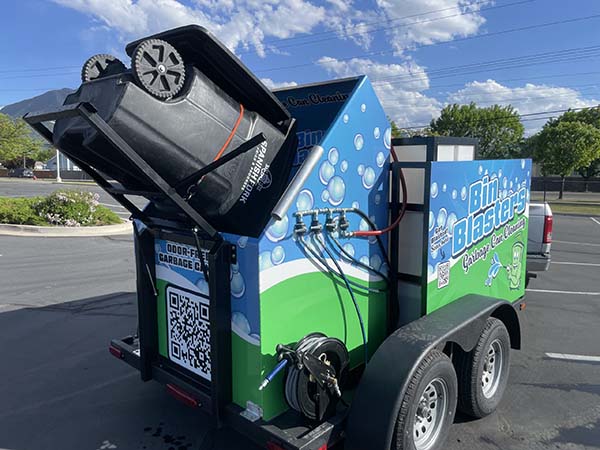
- Fits your budget (financing options are often available).
- Is easy to tow and park.
- Has space for your essential bin cleaning equipment.
- Can handle the weight of water and your cleaning system.
Don’t overbuy here; match the trailer to your current needs, not your five-year dream.
Pick The Right Pressure Washer
This is the heart of your cleaning operation. You need enough power (PSI and GPM) to blast away grime quickly, but efficiency matters too. Consider factors like fuel type, portability (if not trailer-mounted), and durability. Heated water capability? We’ll get to why that’s a game-changer in a bit!
Master Your Initial Routes
Before even thinking about bigger equipment, focus on building and mastering your first few routes. Get efficient, learn the neighborhoods, and build that customer base. Your early equipment should support this phase perfectly. Making sure your equipment is well-suited to the task and the user is fundamental. Once your routes are packed and profitable, then we can talk upgrades.
Pro tip: Get comfortable with basic maintenance yourself. Knowing how to troubleshoot small issues with your pressure washer or trailer on the fly can save you tons of downtime and money.
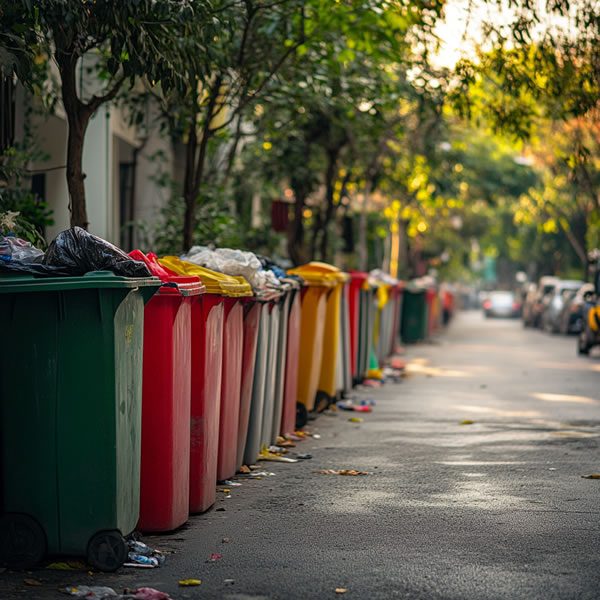
Here’s Why Heated Water Changes Everything
Okay, let’s talk about a secret weapon in the bin cleaning world: heated water. When I first started, I was using cold water like many folks. It worked… kinda. But switching to heated water? Man, it was like going from a tricycle to a rocket ship! It seriously elevates your bin cleaning equipment game.
Some people think it’s just a luxury, but trust me, it’s a core part of providing a top-tier service efficiently. Think about washing greasy dishes – hot water just cuts through it way faster, right? Same principle applies to those nasty bins.
Break Down Stubborn Grime
This is the biggest win. Hot water melts away grease, grime, and sticky residues that cold water just struggles with. You know that caked-on gunk at the bottom of bins? Heated water tackles it head-on. This means less time scrubbing, less water usage overall, and a genuinely cleaner bin. It’s about the cleaning mechanism itself – heat significantly boosts the effectiveness of your cleaning process, similar to principles used in other sanitation industries.
Save Time Between Bins
Because hot water cleans faster and more effectively, you spend less time at each stop. Shaving off even a minute or two per bin adds up massively over a full route. Faster cleaning means more bins cleaned per day, which directly translates to more revenue. It turns your bin cleaning equipment into a high-speed profit machine.
Watch Customer Satisfaction Soar
Customers notice the difference. A bin cleaned with hot water doesn’t just look clean; it feels and smells cleaner. That deep clean tackles bacteria and odors more effectively, leaving behind a freshness that cold water often can’t match [5]. Happy customers stick around, refer their friends, and are happy to pay for a premium service. Heated water isn’t just about cleaning; it’s about delivering a superior customer experience.
Pro tip: Invest in a reliable and efficient water heater system specifically designed for mobile cleaning operations. Ensure it integrates well with your pressure washer and overall trailer/truck setup for optimal performance.
What Equipment Should You Get First?
So, you’re ready to assemble your first bin-blasting machine? Awesome! Choosing the right initial bin cleaning equipment is crucial. Let’s break down the core components you’ll need to get rolling. Remember, we’re focusing on a smart start, not the giant rig you might upgrade to later.
Think of it like building your ultimate toolkit. Each piece has a job, and they all need to work together seamlessly. Getting these foundational pieces right makes everything else easier down the road. You can find various guides and examples online, but focus on what fits your starting plan [4].
Select Your Bin Lifter
Manually lifting dirty, heavy bins gets old fast (and can be tough on your back!). A hydraulic or electric bin lifter is a must-have for efficiency and safety. Consider:
- Compatibility: Does it work with standard residential and commercial bin sizes in your area?
- Lift Capacity: Can it handle potentially heavy bins?
- Speed & Reliability: You need it to work consistently, cycle after cycle.
Install Your Hopper System
This is where the magic happens – catching all that nasty water and debris (we call it garbage juice!). Your hopper needs to be:
- Sized Appropriately: Match it to your water tank size and expected workflow.
- Durable: It takes a beating from water pressure and debris.
- Easy to Clean: You’ll need to rinse it out regularly.
- Designed for Drainage: Efficiently funnel water to your grey water tank.
Plan Your Grey Water Tank
You can’t just dump dirty water down the storm drain! You need a grey water tank to capture the wastewater legally and responsibly. Key factors are:
- Capacity: How many bins can you wash before needing to empty it? This impacts route length.
- Placement: Consider weight distribution on your trailer.
- Drainage: How will you empty it easily and legally at an approved facility?
Getting the tank size right is a balancing act between route capacity and trailer weight/size.
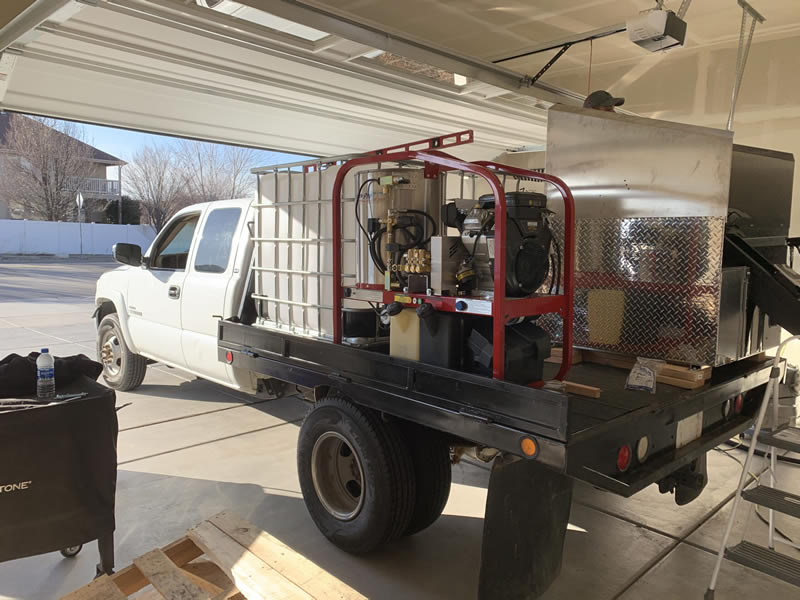
Build Your Mobile Workshop
Think beyond just the cleaning parts. Your trailer or truck bed is your mobile base. You’ll need organized storage for:
- Hoses and nozzles
- Cleaning solutions
- Safety gear (gloves, eye protection – super important!) [6]
- Basic tools for adjustments or minor repairs
- Marketing materials (like bin hangers!)
Having everything organized and easily accessible saves time and frustration. If you’re serious about getting started the right way, check out the opportunities and systems we’ve built at Bin Blasters Franchising.
Pro tip: Label everything! Knowing where every tool, nozzle, and spare part is located instantly saves precious minutes at each stop.
Let’s Talk About Scaling Your Fleet
Okay, picture this: your first trailer is humming, routes are filling up, and you’re thinking, “It’s time to grow!” Scaling your bin cleaning equipment fleet is an exciting step, but again, requires smart planning. You’ve proven the model, now it’s time to expand your capacity and reach.
This isn’t just about buying more stuff; it’s about strategically increasing your ability to serve more customers efficiently. It’s moving from being a solo operator (maybe with your dog riding shotgun like mine sometimes does!) to managing a real fleet.
Upgrade To Larger Trailers
As your route density increases, you might outgrow that nimble starter trailer. Upgrading to a larger trailer can offer significant advantages:
- Bigger Water Tanks: Both fresh and grey water, allowing for longer routes before refilling or dumping.
- Dual Cleaning Setups: Potential to have two cleaning heads operating, drastically increasing speed.
- More Storage: Room for more supplies, tools, and potentially specialized equipment.
This step makes sense when your existing setup is consistently maxed out and you have the demand to justify the investment.
Transform Into Cleaning Trucks
The ultimate step for many is moving from trailers to dedicated bin cleaning trucks. These are often custom-built units integrating all the bin cleaning equipment onto a single chassis. Benefits include:
- Professional Image: Trucks often look more substantial and professional.
- Potentially Greater Capacity: Designed from the ground up for this purpose.
- Easier Maneuvering (sometimes): No trailer to worry about, though overall size can be larger.
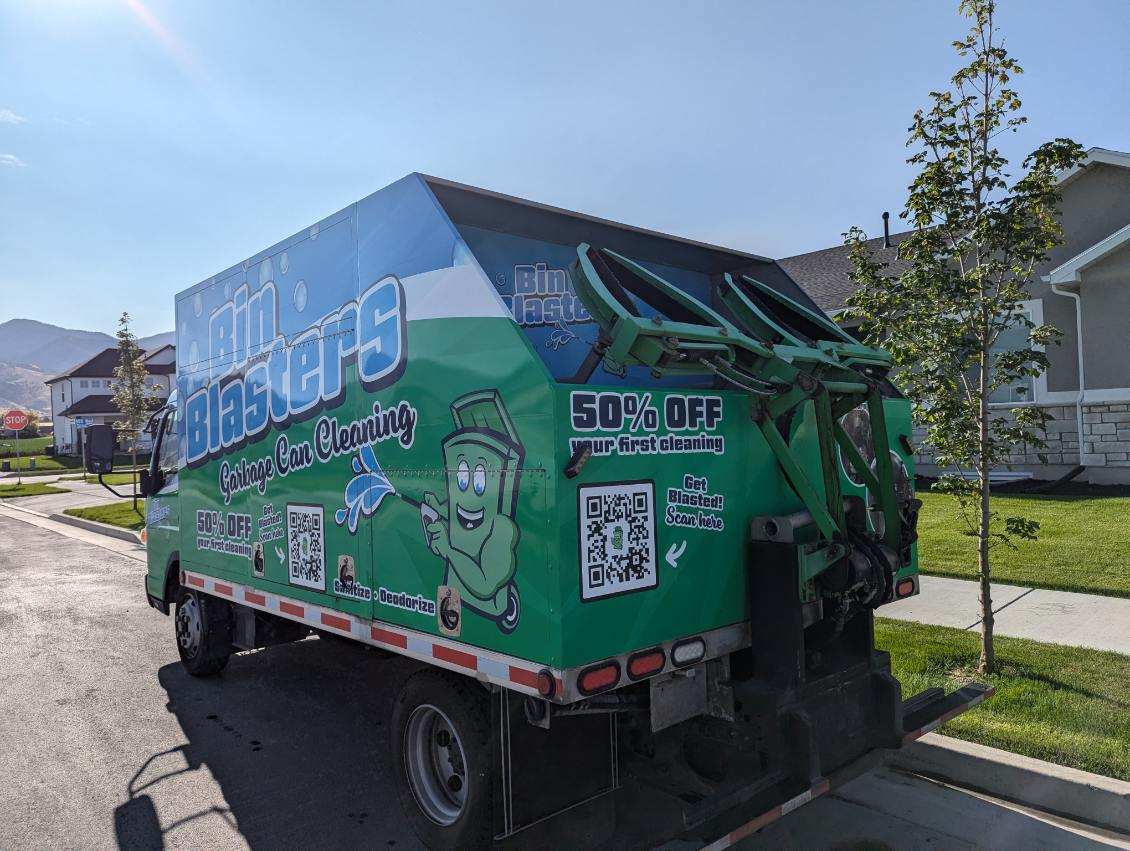
This is a significant investment, usually best suited for established operations with dense, profitable routes or franchisees looking to cover larger territories. Moving to trucks often aligns with hiring more staff and requires solid operational systems. You can learn more about how we support this growth within our franchise system by checking out the About Bin Blasters Franchising page.
Expand Your Service Range
Scaling isn’t just about bigger gear; it’s about reach. Adding more units (trailers or trucks) allows you to:
- Cover multiple areas simultaneously.
- Reduce travel time by dedicating units to specific zones.
- Offer faster response times or more frequent service options.
Each new unit needs a plan – routes, staffing, maintenance – it’s like launching a mini-business within your business. Proper planning prevents growing pains from becoming major headaches [8].
Pro tip: Develop standardized operating procedures (SOPs) for everything – cleaning, maintenance, routing, customer interaction – before you add your second unit. Consistency is key when scaling.
Here’s How To Maximize Equipment ROI
Buying all this cool bin cleaning equipment is fun, but let’s get down to brass tacks: making money! Getting the best Return on Investment (ROI) from your gear is crucial for profitability. It’s not just about having the equipment; it’s about using it smartly and keeping it running efficiently.
Think of your trailer or truck as a money-making machine. The more efficiently it runs, and the longer it lasts, the better your ROI. Wasted time, fuel, or unnecessary repairs eat directly into your profits.
Map Efficient Service Routes
This is huge. Driving aimlessly between stops burns fuel and wastes valuable cleaning time. Use routing software or mapping tools to plan the most efficient sequence for your daily stops. Consider:
- Geographic Clustering: Grouping stops in the same neighborhood.
- Traffic Patterns: Avoiding peak traffic times if possible.
- One-Way Streets & Access: Planning the easiest approach to each bin.
Optimizing routes is a continuous process, especially as you add customers. Some field management software can really help automate this [8].
Schedule Preventive Maintenance
Don’t wait for things to break! Regular maintenance keeps your bin cleaning equipment running smoothly and prevents costly emergency repairs and downtime. Create a schedule for:
- Engine oil changes (pressure washer, truck)
- Pump maintenance
- Filter cleaning/replacement (water, fuel)
- Checking hoses and fittings for leaks
- Inspecting nozzles for wear
- Lubricating moving parts (lifter, etc.)
Treat your maintenance schedule like gold – it protects your biggest asset.
Track Equipment Performance
Knowledge is power. Keep track of key metrics for each piece of major equipment:
- Fuel consumption
- Water usage
- Hours of operation
- Maintenance costs
- Repair history
This data helps you understand the true operating cost, identify potential issues early, and make informed decisions about future upgrades or replacements. It also helps ensure your team is operating safely and efficiently [6].
Calculate Cost Per Bin
Ultimately, you need to know how much it costs you to clean each bin. Factor in fuel, water, maintenance, labor, insurance, and equipment depreciation. Knowing your cost per bin allows you to:
- Set profitable pricing.
- Identify areas for cost reduction.
- Understand the profitability of different routes or customer types.
Maximizing ROI is about sweating the details. Got questions about optimizing your operation? Feel free to reach out through our Contact Bin Blasters Franchising page.
Pro tip: Keep a small toolkit with common spare parts (like O-rings, nozzles, hose clamps) on your truck/trailer. Being able to fix minor issues on the spot can save an entire route day.
Conclusion: Your Professional Bin Cleaning Equipment Journey
So there you have it – a look at navigating the world of bin cleaning equipment! From those crucial first choices to scaling up your fleet and maximizing your ROI, it’s all about making smart, informed decisions based on where your business is right now. Remember my early days? Overspending on gear without the routes to back it up is a classic mistake. Start lean, prove the model, and then invest in growth.
A recurring revenue business like bin cleaning gives you the stability to plan smarter and grow with confidence.
Choosing the right bin cleaning equipment, especially leveraging the power of heated water, and optimizing your operations are key differentiators. It’s what separates the pros from the folks just splashing water around. It’s about efficiency, quality, and building a sustainable business that customers love.
Automated payment systems also play a big role in keeping your operation lean, profitable, and easy to scale. And if you’re exploring add-on services, our Pressure Washing guide is a great place to start.
Ready to learn more about how folks are cleaning up in this industry? Check out what our customers experience over at BinBlasters.com and imagine bringing that level of clean to your community!
Frequently Asked Questions
- Q: What’s the most important piece of bin cleaning equipment to start with?
- A: A reliable pressure washer (preferably with heat), a basic bin lifter, and a system to capture grey water are crucial starting points. Don’t forget safety gear!
- Q: Should I buy a trailer or a truck first?
- A: Start with a trailer! It’s a lower initial investment and perfect for building your first routes. Trucks are a bigger step, best considered once you’re established and ready to scale significantly.
- Q: Is heated water really necessary for bin cleaning equipment?
- A: While not strictly necessary to start, heated water dramatically increases cleaning speed, effectiveness (especially on grease), and customer satisfaction. It’s a highly recommended upgrade for professional results.
- Q: How do I know when to upgrade my bin cleaning equipment?
- A: Upgrade when your current equipment is consistently limiting your growth – meaning you have more demand than you can handle efficiently, your routes are taking too long, or you need greater capacity (like larger water tanks) to expand.
- Q: How can I make my bin cleaning equipment last longer?
- A: Stick to a strict preventive maintenance schedule! Regular checks, cleaning, and fluid changes prevent major breakdowns and extend the life of your pressure washer, pump, engine, and trailer components.
References
- [1] ro.uow.edu.au. An assessment of the repetitive manual tasks of cleaners. https://ro.uow.edu.au/articles/report/An_assessment_of_the_repetitive_manual_tasks_of_cleaners/27700620
- [2] link.springer.com. Equipment cleaning, sanitation, and maintenance. https://link.springer.com/chapter/10.1007/978-3-030-42660-6_13
- [4] YouTube. Trash Can Cleaning Business Equipment Guide (2024) – YouTube. https://www.youtube.com/watch?v=0-S0qIRVx4w
- [5] evergreatpressurewasher.com. Benefits of Trash Bin Cleaning: A Complete Guide. https://evergreatpressurewasher.com/2024/09/18/benefits-of-trash-bin-cleaning-a-complete-guide/
- [6] Wikipedia. Sanitation worker. https://en.wikipedia.org/wiki/Sanitation_worker
- [8] blog.osum.com. The Ultimate Guide to Starting a Profitable Bin Cleaning Business. https://blog.osum.com/bin-cleaning-business-startup/
